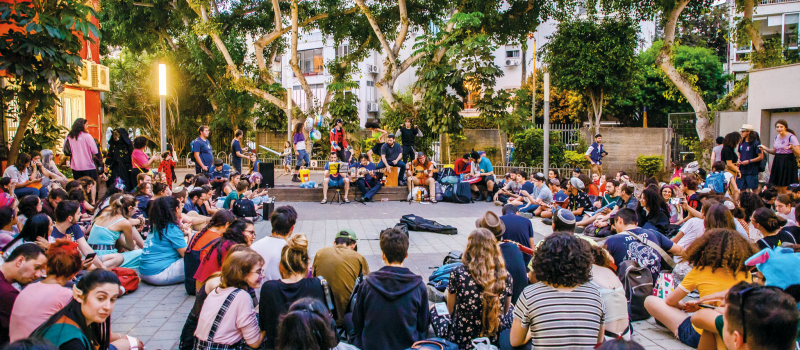ICon: Tel Aviv 2022
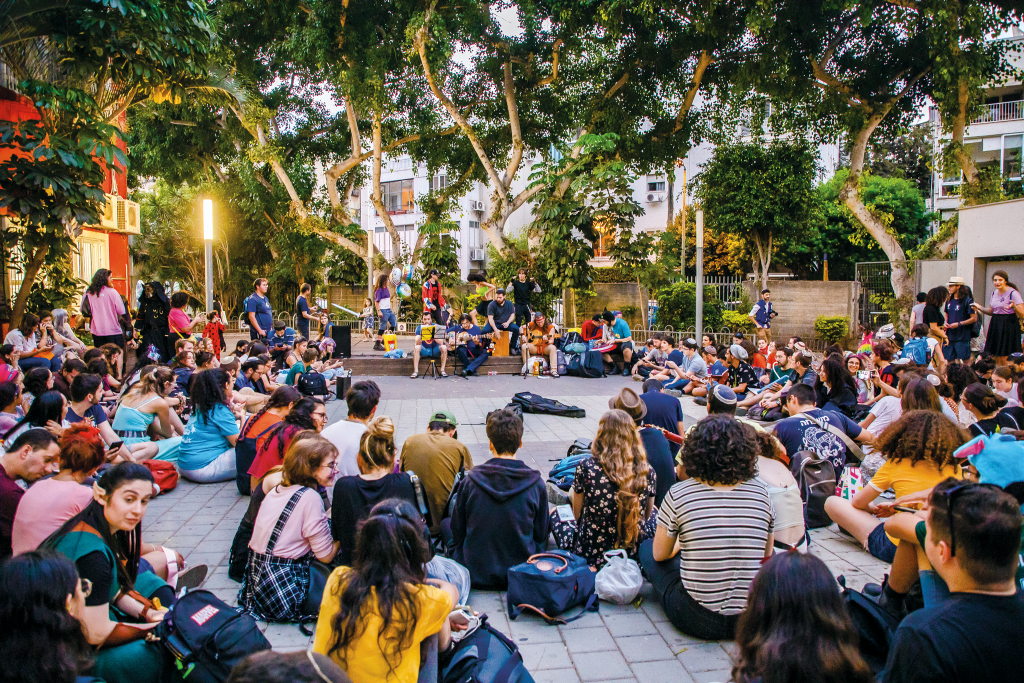
This year’s ICon was the first major convention held in Israel with no COVID restrictions in force since the pandemic began, so it’s not surprising that it was themed “Awakening” – and it did indeed feel like things are back to what they used to be.
Browsing the program on the ICon website was a familiar experience, meaning that you had to open the browser window across the whole monitor to take in the entire program, which included up to 20 events in any time slot and more than 300 events over the course of the three days. Close to 9,500 individual tickets were sold for events over the three days of the festival.
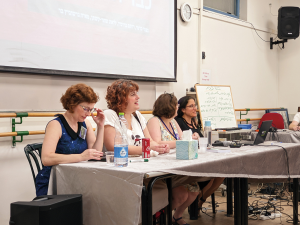
Maya Gershovitz Bar, Rotem Baruchin,
Liat Shahar-Kashtan
The most obvious difference compared to past years was not the number of events (though we did have larger ICons in the past) but the absence of a guest of honor. Inviting a guest is something that is done months, sometimes years, in advance. It requires a certain stability and the possibility to plan ahead, and a global pandemic is not the ideal situation for this. In addition, the past couple of years were financially hard on the organizing bodies of the festival.
This was not the only hurdle that stood in our way this year. A disaster during a religious festival in Israel last year meant that authorities have much stricter safety and security requirements. Which is good – we want everyone to be safe – but as Tomer Shalev, who has managed ICon for the past 13 years, put it, getting the festival certified this year was like going on a quest. It included diving headfirst into the archives at Tel Aviv city hall to find building plans that were a few decades old. We also had to hire more security personnel, who sometimes weren’t sure why exactly they were needed. I overheard one of them saying he’d be willing to work nothing but events like this rather than one soccer match, which is their usual work.
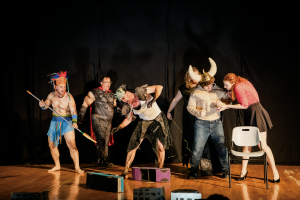
The result of all the hard work by the organizers was wonderful, like going back in time a couple years. It was great entering the venue to see all the dealers’ stalls, the people mock-fighting in the arena, and the wonderful cosplay. Even waiting in lines again felt a bit nostalgic, although that wore off quickly.
There were five halls in which panels and lectures were held, some of them remote panels held on Zoom and shown at the festival. This setup of remote panels is one of the good things we were able to take from the challenges of holding conventions during social distancing and lockdowns. Another is livestreaming one event at each time-slot so people who are unable to get to the festival could purchase passes and watch at least part of ICon remotely. Most of the lectures and panels were recorded and will be available online (first for people who bought passes, and after a few months for free to everyone).
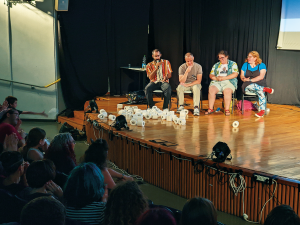
Nir Sharon, Inbar Meyerson
The panels and lectures covered, as usual, a great number of topics. The archeologist Dr. Yael Abadi-Reiss talked about “protohistory,” the processes that led humans from prehistory to history. Dr. Yonat Eshchar talked about the possibility that robots might one day feel empathy, and how this topic is dealt with in science fiction works. One panel called “Your Next Optimistic Book” discussed hopepunk, another how to plan for the future once you’ve been turned into a vampire, and yet another looked at gods and god-like beings in speculative works.
Quite a few events dealt with writing. In a panel about experimental writing, writers and editors talked about new forms and themes in writings, and the points where it all might break down. “Fanfics that Will Never be Written” was a live writing event in which the audience pitched the most unlikely combinations of fandoms and characters to writers Marina Berlin and Rotem Baruchin, and they tried to come up with a story on the spot.
Two panels that have become staples of ICon in the past few years, and link fiction and the real world, were held once more this year. In “But Why Didn’t You Ask an Expert?!”, experts in the humanities discussed how their fields are portrayed in fiction – from international law through state care of children to cults. “How the Hell Do They Know This?” looked at the ways in which cutting edge science is expanding our knowledge and how it might be used in fiction.
Since ICon is held during a school holiday it has made an effort in recent years to have more activities for children, both as a way to bring them into the community and to allow parents to attend without needing to get babysitters or find other solutions. For the youngest children there are readings, but there were also writing workshops for young writers, a workshop in which kids could learn how to do “magic” with basic science, and an introduction to LARP fighting by experienced LARPers.
One of the organizing bodies of ICon is the Israeli Role-Playing Society, so there is a lot of gaming content at ICon. This year there were ten rooms where roleplaying games took place. These were geared both toward experienced gamers as well as to people who wanted to experience games for the first time. As in previous years, there was a large tent where people could borrow tabletop games and play them, and naturally “pick-up” games sprouted wherever there was a flat surface.
There were two original productions at ICon this year as well as a gameshow that combined pre-recorded and improvised parts. There was also, for the first time, a “geeky stand-up” show, which was very funny. There were two sessions of “red carpet” shows where cosplayers showed off their creations, and on the last day the official
Masquerade took place and awards were given. During the closing ceremony, the Geffen awards were given out and the winners in the Einat Peleg writing competition were announced.
I believe that “Awakening” is the unofficial theme of many conventions all over the world this year. If ICon is any indication, we’ve awakened on the right side of the bed. The convention was not yet fully back to what it used to be, but the complaints about the venue not being large enough were heard once more, and we seem to have adopted some of the lessons and techniques learned during the past couple of years.
This report and more like it in the November 2022 issue of Locus.
 While you are here, please take a moment to support Locus with a one-time or recurring donation. We rely on reader donations to keep the magazine and site going, and would like to keep the site paywall free, but WE NEED YOUR FINANCIAL SUPPORT to continue quality coverage of the science fiction and fantasy field.
While you are here, please take a moment to support Locus with a one-time or recurring donation. We rely on reader donations to keep the magazine and site going, and would like to keep the site paywall free, but WE NEED YOUR FINANCIAL SUPPORT to continue quality coverage of the science fiction and fantasy field.
©Locus Magazine. Copyrighted material may not be republished without permission of LSFF.


